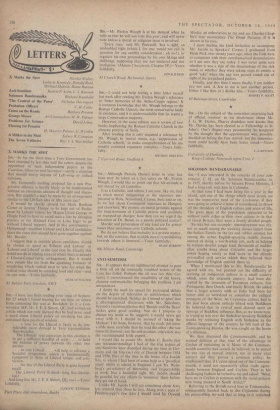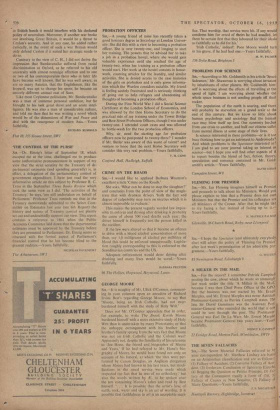SOLOMON BANDARANAIKE
SIR,---I was interested in the remarks of your con- tributor, C. H., on Mr. Solomon Bandaranaike, as, in 1955, shortly before be became Prime Minister, I had a long talk with him in Colombo.
At that time I had been living for a year in the island, and one of the things which most struck me was the imperative need of the Ceylonese, if they were going to achieve a sense of nationhood, to throw off the thraldom of English culture and ways- of life, The great mass of the population appeared to be without roots either in their own culture or in that of Great Britain; they were a deeply divided people.
To take but one example : unemployment was rife, not so much among the working classes (apart from the Indian Tamils on the tea and rubber estates), but among the urban English-speaking middle classes; instead of doing a worth-while job, such as helping to reclaim derelict jungle land; thousands of middle- class youths hung about Colombo and the larger towns hoping vainly to find work in the already overstaffed civil service which they believed their knowledge of English entitled them to.
When I mentioned this to Mr. Bandaranaike he agreed with me, but pointed out the difficulty of reviving an indigenous culture in a small country which, since the sixteenth century; had been dis- rupted by the intrusion of European cultures, first Portuguese, then Dutch, and finally British. He added that a larger country such as India had been far better able to withstand or assimilate the cultural pressures of the West. As Ceylonese culture had in the past been almost entirely linked with Buddhism. he believed that its revival must depend upon an Upsurge of Buddhist influence. But,. as we know now, in trying to win over the Sinhalese-speaking Buddhist monks by replacing English with Sinhalese as the official language of the country he fell foul of the Tamil-speaking Hindus. He was caught on the horns of a dilemma.
We then discussed the Commonwealth, and he seemed dubious at that time of the advantage to Ceylon of remaining in it. Many of the Common- wealth countries had ceased, he believed, to be united by any ties of mutual interest, nor in many vital matters did they- purs'ue a common policy; he emphasised that, if Ceylon opted out of the Common- Wealth, it need not necessarily affect trade agree- ments between England and Ceylon. Then in his challenging fashion he turned to me and asked : 'What have we in Ceylon in common with the racial policies now being pursued in South Africa?'
Referring to the British naval base in Trincomalee, subsequently handed back to the Ceylonese during his premiership, he-said that as long as it remained
-in British hands it would interfere with his declared policy of neutralism. Moreover, if another war broke out involving Great Britain, it would be a threat to Ceylon's security. And in any case, he added rather cynically, in the event of such a war Britain would only defend Ceylon if it suited her strategic needs to do so.
Contrary to the view of C. H., I did not derive the impression that Bandaranaike suffered from racial discrimination at Oxford, as he referred to his old university with almost nostalgic affection and to one or two of his contemporaries there who in later life have become well known. But he was well aware, as are so many Asiatics, that the Englishmen, like the leopard, was apt to change his spots; he became an entirely different animal east of Suez.
Like most Ceylonese politicians, Mr. Bandaranaike was a man of immense personal ambition, but he brought to his task great drive and an acute intel- ligence. He was also a man of considerable culture, and told me then that he was writing a novel which would be of the dirtienSions of War and Peace and deal with the resurgence of modern Asia.--Yours faithfully,
Flat 10, 155 Sloane Street, SW
RICHARD RUMBOLD







































 Previous page
Previous page